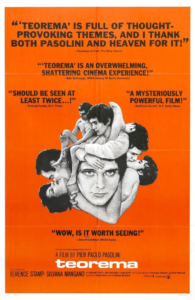|

Synopsis:
A mysterious guest (Terence Stamp) at an Italian villa provokes erotic desire in all its inhabitants — including the mother (Silvana Mangano), the father (Massimo Girotti), the teenage son and daughter (Andres Jose Cruz Soublette and Anne Wiazemsky), and their maid (Laura Betti).
|
|
Genres, Themes, Actors, and Directors:
- Bourgeois Society
- Catalysts
- Italian Films
- Pier Paolo Pasolini Films
- Sexuality
- Terence Stamp Films
Review:
Pier Paolo Pasolini’s enigmatic religio-political allegory (is Stamp a Christ figure, an emissary of the dark side, or a quietly liberating revolutionary?) falls squarely within his unique oeuvre of audaciously provocative films. Little overtly “happens” in Teorema, and even less is said; most of the film’s sparse dialogue occurs midway through the narrative, as each character reflects on how Stamp’s arrival has changed them, and the impact his imminent departure will have upon them (with responses ranging from “You’ve simply destroyed the idea I’ve always had of myself.” to “You have filled my life with a total, real interest.”). Otherwise, the bulk of the screenplay is filled with surprisingly chaste erotic encounters, and bouts of personal crisis — the most intriguing of which is Betti’s emergence as some sort of village saint. As Dan Callahan notes in his review for Slant Magazine, “It’s all very grand and vague and shapeless, filmed better than most of Pasolini’s movies, but indulgent and fairly meaningless”; DVD Savant accurately asserts that “viewers will need to already be riding Pasolini’s specific philosophical wavelength to appreciate it — for most it will be a slow and uninvolving experience.” Featuring a weird, often incongruous score by Ennio Morricone.
Redeeming Qualities and Moments:
- Effective cinematography and lighting

Must See?
Yes, but simply for its historical importance. Listed as a Cult Movie in the back of Peary’s book, though I’m not sure it holds that status any longer.
Categories
- Historically Relevant
- Important Director
Links:
|
One thought on “Teorema (1968)”
Not a must – in fact, this film proves once again that a little Pasolini not only goes too long a wayward way but that his prior status as an art house favorite (of sorts) may be continuing in decline. I can’t help but feel that, as the years go by, audiences (and FFs) will care less and less about his cryptic views. (Much like Godard, actually.)
This movie eluded me for years and I’ve just now caught up with it. A Swiss friend of mine (we got along amazingly well, even tho he adored both Pasolini and Godard) often mentioned this film to me and insisted I see it. (I believe he was “already…riding Pasolini’s specific philosophical wavelength”, and was vaguely bisexual.) I could never find it.
But, boy, did I find it tiresome to sit through now. T-i-r-e-s-o-m-e. Oddly enough, I do like the premise. But, for a film ‘drenched’ in sex, its power and the emptiness/confusion which that power leaves behind…the film is practically devoid of real sex. And real sex is exactly what it needs (not just the sex, but how the characters react during it, and how they are changed while it is happening). We are, to an unexpected extent, allowed to see Mangano’s descent as she becomes a whore (even if that eventually becomes somewhat laughable). But we mostly witness the “chaste erotic encounters” (although the ‘sex’ with dad is much more like two men walking deep into a field just to shake hands).
Being a product out of a very Catholic country – even though it was the progressive ’60s – Pasolini may not have been able to give the film what it needed to really clarify his point. But even if he felt he had more freedom, I don’t feel he’d’ve been disciplined enough a filmmaker to carry it off. For the most part, Pasolini’s films *are* self-indulgent and sloppy in their anarchy. Large sections of this one are very much open to interpretation but, myself, I find it a colossal bore.